Today I have to make sure that I get to do every single errand that involves going into Hania, as it's the last day my children are at day camp (ie being supervised by someone else). After parking the car a zillion miles away from the centre (as usual), and carrying a computer screen in my hands (it broke down while under guarantee), I started on the little tasks that make me walk from one end of Hania to the other every time I need I go into my hectic little town, with its erratic traffic problems which are always exacerbated in the summer.
Coupled with the congestion, there is the heat. Sweat poured down my back, my clothes were sticking to my skin, my head felt as if it were on fire. To make things worse, I had forgotten to fill my water bottle from my home, meaning that I was carrying extra useless weight in my bag aside from mizithra, okra, vine beans, children's books, among others. My mouth was dry, my body slowly dehydrating, and it was only half past nine. I needed a sit-down in the shade with something cool to drink.
My errands had taken up to the Agora, behind which there is a large square with cafes and bars surrounding it. I walked along the road and chose the first empty space offering ample shade; the name of the cafe and what it served did not interest me at that moment. In fact, whenever I'm eating out, the food and where it comes from never interests me, because I know that I can never be sure of the truth of anything the restaurateur claims about the menu. Luckily for those who live in Hania, when eating out, there is usually a choice of views, scenery and atmosphere to enjoy apart from the food: this is the motivating reason for me to eat out.
My view was not the most alluring: double parked cars, souvenir shops, tacky jewellery stores and other nondescript eyesores. Even the sight of the tourists who were milling about the area - a well-known tourist spot which may also be referred to as a trap by some - was not uplifting: after a certain point, one easily tires of seeing old-fashioned travel book images from a bygone era, young lasses clad in bikini tops and wraparound skirts and bare-chested men, their shoulders laden with a dusty backpack, in the middle of the town where we all conduct both our formal and informal business. As AA says, this is the image most people still have of Greece: a place where everyone lives by the sea beating octopuses on rocks and traveling by donkey. My tired feet and aching arms had not foiled my senses.
I looked up, spotting the name of the cafe: Ano kato: Serraiki Bougatsa, which could loosely be translated as "Topsy Turvy: Sweet Pie from Serres." Bougatsa from Serres? Foreign food, food that our foreign tourists are aching for, the term foreigners including urbanite Greek travellers from Athens, the kind who buy bougatsa in Athens which bears no resemblance to the bougatsa served in Hania, the kind of place a non-Cretan Greek would look for if words like boureki, dakos and stamnagathi scare them, fearing the unknown as we all do to some extent, which is why many of us will search for a Casa di Pasta restaurant in Thailand, or a burger chain in China.
"Parakalo?" Just when I was thinking that this might be a self-service cafe, the waiter had arrived, carrying a serving tray with coffees and glasses of water with lots of ice cubes. He had been busy preparing orders to be served to the local shop-owners, another one of those traditions which gives Greece a picture-postcard image: a waiter crossing the street with a tray of refreshments, specially ordered by businesspeople. No messing around with the cafetiere for them; silver service that even the plebs can enjoy. He left one of the glasses of water on my table.
Being on a diet - always one that is broken - I had left the house without having breakfast, so I decided to order some bougatsa, in full knowledge that it would contain three times the number of claories that my home-made breakfast would contain. I noticed the food display case: croissants, rolls, pastries, but which of all of them was the Serraiki bougatsa?
"A plunger coffee and a serving of bougatsa, please."
"The bougatsa's going to be ready in about ten minutes," he replied very politely. I was beginning to like this place.
"No problem," I smiled, I'm in no hurry."
He smiled too. "And you know it's the cream-type of bougatsa." Oh, the joy of being treated like a local...
As it was still early morning for some, the cafe was empty. I was being kept company by three empty seats round my table. I laid all my bags on the seat opposite mine, when it occurred to me that those inanimate objects might just have a better view than I did. I got up and changed places with the bags.
My whole world changed. No more cars and tacky souvenirs. I saw a different world: traditional handcrafts and woven textiles, a huge linden tree, the wall of the main square where the Cathedral of Hania is located. The most basic elements of the area had probably not changed since my parents' time before they left Crete to emigrate to New Zealand. I wondered whether they had walked in the same side street - probably it had not been pedestrianised in their time - before they left the country. It had the kind of look we are familiar with in those old Greek black and white movies which I used to see at the cinema in Wellington during a private screening for the Greek community.
The ten minutes it took for the bougatsa to arrive passed pleasantly watching the shop owners waiting for business, sweeping the outside of their shops and chatting to their neighbours. A hotel owner sat in the alley opposite with a bowl of uncleaned horta reading her newspaper. Even the cobblestones on the street took on a new interest.
Serraiki bougatsa was surely very different to the bougatsa traditionally served in Hania: custard instead of mizithra cheese, icing sugar and cinnamon instead of white granulated sugar. Even the filo pastry tasted different. But it was tasty and made perfect breakfast fare. If only the woman who's always serving at the counter in Bougatsa Iordanis could be as polite as the waiter at Ano Kato...
©All Rights Reserved/Organically cooked. No part of this blog may be reproduced and/or copied by any means without prior consent from Maria Verivaki.
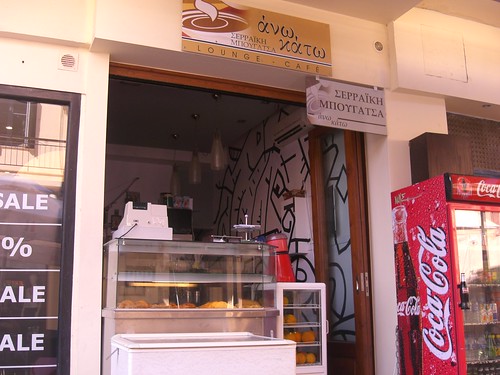
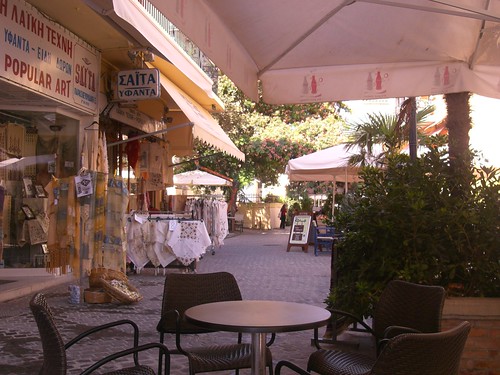
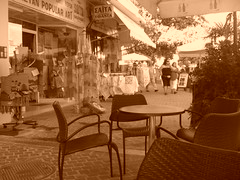
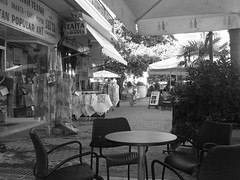
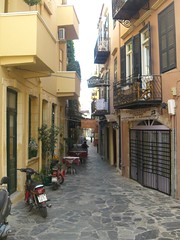
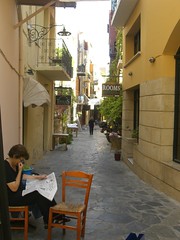
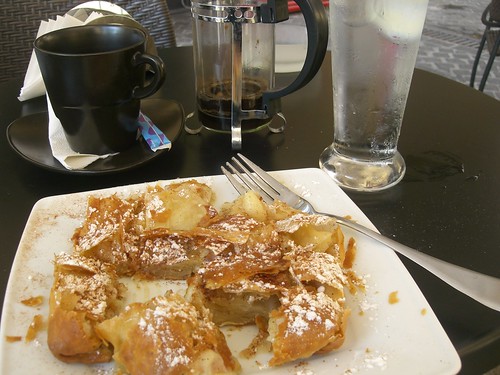
I fascinating glimpse of your life on a dull, damp and windy morning.
ReplyDeleteI could feel the sun like a hammer and the sweat.
I had wondered how you got on with the language - now I realise you grew up speaking it.
Enjoy the weekend and thanks for a charming post.
I have the taste of bougatsa on my tongue!Yummy!!!
ReplyDeletePS:"Χρόνια Πολλά Μαρία!!!"
(Στα ελληνικά οι ευχές για να αποδωθούν σωστά...)
Hi Maria, I so enjoyed this morning outing with you at the cafe.
ReplyDeleteThanks very much for the insights on the Dormition and the Greek names and name days. So good to learn from one who really lives it.
I can hardly wait for your surprise on Sept. 6!
I am frightfully behind on blog reading and everything else due to my job and having to take care of a Crusader house for the past month. But I just got caught up on all your posts now, and I love them all. Chania is so lucky to have you and to have you blogging.
what a lovely narration! and the picture is yummy - worth the wait of 10mins am sure! and those sepia and b&w pics are lovely too!
ReplyDeleteDo visit here for my post about Rakshabandhan - a celebration of sibling bonding in India!